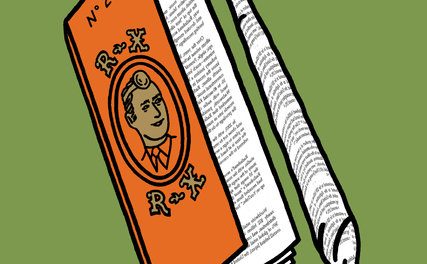Taps
By Tom O’Connell, MD, in O’Shaughnessy’s Winter/Spring 2008
Claudia and I first met in April 2002 at a now-defunct Oakland pot club widely known as “The Third Floor.” We had both been recruited to screen patients by Larry Kristich, the club’s very unusual owner who had turned it into the busiest in the Bay Area after less than a year of operation. I now realize that the volume at Larry’s club is what allowed me to pick up on the patterns in the histories of pot smokers which suggested that many of the younger ones were almost certainly treating Attention Deficit Disorder. When I discussed it with Claudia, she didn’t disagree, but expressed great interest —a response which, I would learn over time, was very unusual for a cannabis specialist.
Claudia was not simply a “potdoc.” She was a university-trained pediatrician who had been specializing in Adolescent Medicine, and she taught a course in clinical medicine at the University of Southern California School of Medicine.
Back then, she’d just taken on her HMO [Garden Valley Medical Group] over an ethical issue and been made to suffer financially. She had great courage and charisma and —the word is greatly overused but it applies to her— compassion.
I don’t know who inspired the other more as far as ADD and pot are concerned; all I know is that we shared our insights and enthusiasm. It was therefore personally disappointing when she (very quickly) became busy enough in Ventura to give up her week-end trips to Oakland.
She was invited by Rep. Mark Souder to testify before his subcommittee in April, 2004, almost certainly with the idea of making an issue of her recommendations of pot use by a few adolescents. However, Claudia acquitted herself so well the plan backfired and Fox News downplayed her testimony, while its rival at MSNBC gleefully picked up on it. Those with a desire to see her in action can find her interview with Keith Olbermann on the web.
Claudia had been pressured by certain reformers not to testify because they feared she would be embarrassed by Souder over her cannabis recommendations. The self-appointed medical experts who tried to dissuade her are typical of drug-policy reform advocates who have come to believe they know more about clinical medicine than California physicians who have dealt with patients one-on-one for years.
I will miss Claudia and mourn the contributions she wasn’t given the time to make.
Remembering Claudia Jensen
By Fred Gardner in O’Shaughnessy’s Winter/Spring 2008
“I am a 49-year-old mother of two teenage daughters,” is how Claudia Jensen described herself to a Congressional subcommittee in April 2004, “and a physician educated at the University of Arkansas for both undergraduate and medical schools. I studied Pediatrics at the University of California at Irvine, completing my internship and residency training in 1981. I have a total of 23 years working as a pediatrician, first as an HMO physician with Cigna HealthPlans, then in private practice in Ventura, CA.
“I currently work two days a week in a small community clinic serving a poor patient population, three days a week in my own private office, and I teach first-year medical students one day a week at the University of Southern California Keck School of Medicine. I have always had a reputation for being a patient advocate since the very beginning of my training. Congressman Souder has asked me to discuss my practice of recommending marijuana for use by ‘dozens of patients, including children with ADD’”
Dr. Jensen died Sept. 15, of breast cancer. One of her former students, Rolando Tringale, MD, passed along the sad news. A wave of anger lapped at the shore as I remembered how I’d come to know her.
One evening in March 2004 Dale Gieringer of California NORML called. He said he’d been asked by Steve Fox of the Marijuana Policy Project to convince Jensen that she shouldn’t go to Washington to testify before Souder. The Los Angeles Times had run a story about Jensen approving cannabis use by a troubled high school student. Fox and Rob Kampia of MPP feared that Jensen defending her practice before Congress would discredit the movement and undermine the prospects for reform, Dale said. The MPPers had dissuaded Oregon osteopath Phil Leveque by telling him that Souder was planning an “ambush” and that he would be “personally embarrassed.” But Jensen needed more urging.
I applauded Dale for not calling her and did so immediately myself to warn of MPP’s ongoing manipulation attempt. She said nobody could turn her around, she was looking forward to bringing her daughters to Washington, which they’d never seen, and to telling Congress about so-and-so- and so-and- so, out-of-control teenagers who could function normally thanks to cannabis. She discussed her patients’ lives and their problems with the utmost empathy.
A few weeks later I took the red-eye from Oakland to Dulles and an airport shuttle to the hotel where Claudia and her daughters, then 16 and 13, were in the all-important make-up phase of the morning. The girls were brilliant, self-confident, and very keen to see Freddy Adu, the young soccer star who had just been signed by a U.S. team. We took a cab to the NORML office where someone who knew the ropes (Allen St. Pierre, if memory serves) gave Claudia advice and reassurance. Then on to the hearing, which I wrote up for the paper of record (Anderson Valley Advertiser, 4/7/07):
Ventura pediatrician Claudia Jensen testified April 1 before the House Government Reform Subcommittee on Criminal Justice, Drug Policy and Human Resources, chaired by Indiana Republican Mark Souder. The Subcommittee had also invited Dr. Phillip Leveque, who has written about 1/3 of the approximately 12,000 approval letters submitted to Oregon’s state-run Medical Marijuana Program.
Agents of the Marijuana Policy Project, a Washington-based reform group, had urged Leveque, 81, not to attend. MPP “Congressional Liaison” Steve Fox and others phoned repeatedly to warn him that the encounter would be humiliating. Leveque decided to heed their warnings and asked your correspondent to read aloud a statement he’d written. A Souder staffer nixed my offer, but said the statement would be entered into the record. It included the line “Cannabis is safer than Washington D.C. drinking water”- a topical sound bite, given that lead in the drinking water has been a major story of late.
As the Great Playwright would have it, Dr. Jensen took a seat in the gallery next to Joan Jerzak, the Chief of the Medical Board of California’s Enforcement Division, who was also there as a witness. They struck up a conversation, which soon became convivial. I thought about going over to advise Jensen that anything she said might be held against her. (The Board is investigating Jensen for approving cannabis use by three ADD patients.)
When they were called to testify, Jensen and Jerzak again sat next to one another at the witness table. They looked like sisters -two big, sensuous strawberry blondes.] Souder grilled Jerzak about why the Board wasn’t enforcing federal law and the chief staunchly explained the Board’s obligation to follow California law! The chief is a lot more likeable when she’s on our side …
Jensen’s testimony was from the heart. She defended her recommendations of cannabis for several patients with attention deficit disorder. She could have avoided the subject until the Q&A session but she told it as a success story. Souder was not initially hostile and seemed sincere when he thanked her for coming. During the Q&A, however, he expressed shock and disapproval that she was relying strictly on feedback from patients rather than established medical authority. She countered that she, too, wished that she didn’t have to conduct her own studies. Claudia won every exchange.
Rob Kampia also testified that afternoon. Having successfully pressured Dr. Leveque not to come, the young bureaucrat took his place. And then he proceeded to badmouth Leveque! I could hardly believe my ears as Kampia chastised the Subcommittee for having “invited Dr. Leveque, who is literally the only physician in Oregon to have written an inordinate number of recommendations.”
Inordinate? Phil Leveque is a World War Two hero, a decorated infantryman. This scene was taking place at the height of Tom Brokaw’s “greatest generation” blither. Leveque’s testimony would have been compelling and the Congresspersons wouldn’t have laid a glove on him. Certainly Claudia Jensen’s account of how cannabis helped a failing student turn his life around caused no embarrassment to her or “the movement.” MPP’s effort to keep away the brave doctors on whose shoulders the movement actually rests was more than opportunism, it was blacklisting.
To marginalize indigenous leaders like Claudia Jensen does not advance the movement, it undermines it. The moneymen in DC claim that the indigenous leaders (to whom they may pay lip service for past services rendered) have flaws that make them anathema and that more “professional” and respectable spokespersons (i.e., themselves) can carry the message more effectively to the American people.
There’s a doctor in Chicago named David Ostrow whom MPP sees fit to fund. In March I got an email from Ostrow in response to a Counterpunch piece about cannabis as a treatment for post-traumatic stress. He described himself as head of the “Medical Marijuana Policy Advocacy Project (MMPAP)” which was recruiting members for its “scientific advisory board (SAB).” He requested information about “a Dr. and a group called Cannabis Clinicians (sic).”
Before I could reply there came a follow-up:
Subject: Ooops!
Date: Tuesday, March 13, 2007 9:47 AM
From: David Ostrow <david@OstrowAssociates.com>
To: <fred@plebesite.com>
Cc: <jeremy@OstrowAssociates.com>, ‘Joe Haptas’ <joe@OstrowAssociates.com>Fred- I forgot to mention that the Dr. I am interested in contacting is Dr. Phillip Penny, not Todd M. The latter Dr. is well known to me and while he has been an important driving force in the legalization of medical marijuana in CA, he unfortunately tends to go off the deep end into recommending MMJ for just about any condition in the DSM IV, which doesn’t help our cause when we are trying to get Drs. to consider MMJ for specific indications.
David O
Tod Mikuriya, my close friend had a few months to live as I read this and pondered whether to share it with him or spare him the gratuitous insult. You’d think the physician hired to advance the Marijuana Policy Project agenda would have some savvy, some political sophistication. Intrigued by Ostrow’s insensitive email, I phoned him with the requested info (“It’s Dr. Philip Denney… one ‘l’ in Philip…”). David O was very forthcoming about the work “Ostrow Associates” was doing for MPP, but wouldn’t say how much he was getting paid. He had a shock of recognition as I described O’Shaughnessy’s, the journal I edit. “Oh, you have a terrible reputation! Terrible,” he blurted. “That’s right,” I said cheerfully. He kept on talking, uninhibited. Said MPP was sponsoring a panel at the upcoming American Medical Association meeting in Chicago. They’d be flying in doctors from California (Donald Abrams), Montreal (Mark Ware), and elsewhere. I suggested that a California doctor who had monitored cannabis use by thousands of patients might be a good addition and told him how to reach Frank Lucido, whose practice standards are unassailable. One of the participants reported subsequently that the panel was a disaster -sparsely attended, and only by doctors already conversant with the subject. “I don’t think a single delegate came who wasn’t known to the organizers,” said my source, “Not one drawn by curiosity. It was a complete waste of my time.”
Goodnight, Dear Girl
Dr. Jensen was convinced that Chief Jerzak’s retirement from the medical board about a year after their Congressional appearance was a result of federal pressure. Jensen contacted Jerzak, who said that she’d quit because she wanted to spend more time with her husband and to travel. Jensen didn’t quite believe her. “She wouldn’t work her whole career to become chief and then just quit,” was Claudia’s theory.
Our last correspondence was in early August. I’d asked about patients who use cannabis to deal with insomnia. Claudia answered, “Those who have anxiety tend to use an inhaled indica (preferably one dose) within half an hour of desired sleep onset. The patients who wake up in the night I have using indica edibles. Unfortunately (and fortunately), it is very strain dependent. Each patient has to search for his/her best mix. I have one patient who has to use a high-grade sativa to enhance sleep onset.”
She lived in Capitstrano Beach and we’d go months without being in touch, so I don’t miss her acutely. In fact, I can’t even believe she’s gone.





